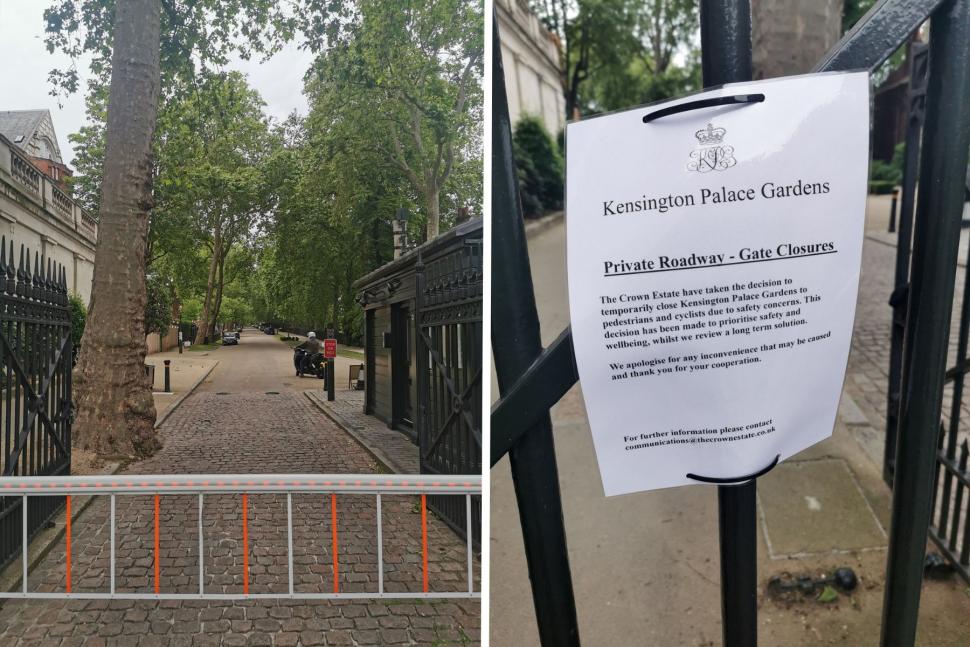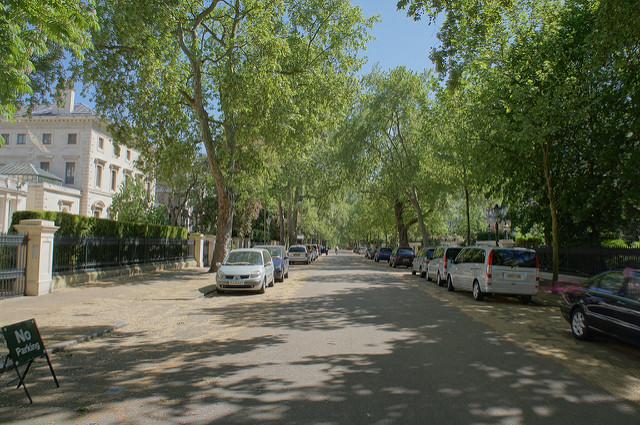- News
- Reviews
- Bikes
- Accessories
- Accessories - misc
- Computer mounts
- Bags
- Bar ends
- Bike bags & cases
- Bottle cages
- Bottles
- Cameras
- Car racks
- Child seats
- Computers
- Glasses
- GPS units
- Helmets
- Lights - front
- Lights - rear
- Lights - sets
- Locks
- Mirrors
- Mudguards
- Racks
- Pumps & CO2 inflators
- Puncture kits
- Reflectives
- Smart watches
- Stands and racks
- Trailers
- Clothing
- Components
- Bar tape & grips
- Bottom brackets
- Brake & gear cables
- Brake & STI levers
- Brake pads & spares
- Brakes
- Cassettes & freewheels
- Chains
- Chainsets & chainrings
- Derailleurs - front
- Derailleurs - rear
- Forks
- Gear levers & shifters
- Groupsets
- Handlebars & extensions
- Headsets
- Hubs
- Inner tubes
- Pedals
- Quick releases & skewers
- Saddles
- Seatposts
- Stems
- Wheels
- Tyres
- Health, fitness and nutrition
- Tools and workshop
- Miscellaneous
- Tubeless valves
- Buyers Guides
- Features
- Forum
- Recommends
- Podcast
news
 Kensington Palce Gardens closure (image: David Milner)
Kensington Palce Gardens closure (image: David Milner)Gates, barriers, and chicanes being installed on Britain’s “most expensive street” to keep cyclists out
"Safety" measures, including gates, barriers, and chicanes, are being installed on Kensington Palace Gardens — the London avenue dubbed Billionaires' Row and Britain's "most expensive street" thanks to its £35 million average house price — to keep cyclists out and prioritise the "safety and wellbeing" of diplomats and other high-profile, ultra-rich residents.
Two weeks ago, it was reported that Kensington Palace Gardens, a half-mile-long tree-lined avenue running parallel to the facade of Kensington Palace between Notting Hill Gate and Kensington High Street, would be closing its gates to pedestrians and cyclists.
The street — which is home to several foreign embassies, such as Russia and Israel, France’s ambassadorial residence, and notable private residents such as former Chelsea FC owner Roman Abramovich, Tamara Ecclestone, daughter of former Formula 1 chief Bernie Ecclestone, and Princess Haya of Jordan, to name a few — has long been closed to motorists. However, pedestrians and cyclists had been able to enter at any time through gates guarded by sentry boxes at either end of the avenue.
After the widely-critised decision to close the street to the public citing "safety reasons", The Standard now reports that safety measures are being installed to keep cyclists on the carriageway, as the street plans to open to pedestrians.
The Crown Estate, which owns and manages the avenue, said that York Passage will reopen to pedestrians but will remain closed to cyclists, while Palace Avenue will reopen to pedestrians, but cyclists must dismount before using the gate.
A spokesman said it will be monitoring the temporary measures "for several weeks as we look to design and implement a longer-term solution".
Earlier this month, the Crown Estate said that it took the decision to close the street to "prioritise safety and wellbeing". Sources also claimed that there had been numerous complaints about the behaviour of cyclists on the street, which allegedly put residents, diplomats, and visitors "at risk" and led to several near misses.
Just a couple days after the street closed its gates, the decision was widely condemned, with both Labour and Conservatives starting petitions demanding the Crown Estate reverse its decision.
Joe Powell, the Labour parliamentary candidate in Kensington & Bayswayer, slammed the decision as "selfish and spiteful", calling for the "crucial, safe connection between Notting Hill Gate and Kensington High Street" used by "thousands of pedestrians and cyclists every day" to be reopened.
"I'm calling on The Crown Estate to urgently reopen Kensington Palace Gardens to pedestrians and cyclists after they decided to close the road," he explained. "Kensington & Chelsea is already ranked the worst inner London borough for active travel by the Healthy Streets coalition. The last thing we need with a council and MP with a track record of blocking any initiatives to make our streets safer is one of the few safe roads for pedestrians and cyclists to be closed."
> "Dangerous cycling" law will be passed following election, Labour and Conservatives confirm
Back in 2016, plans to make Kensington Palace Gardens one of London's cycling Quietways – signposted routes on quiet back streets designed to offer a calmer and safer network for people on bikes – were scrapped following residents expressing fears that the use of the road by "the masses" would compromise security and "cede its exclusivity".
The Royal Borough of Kensington and Chelsea council and Transport for London received 15 responses to the consultation on the proposed Quietway, including "several" respondents who claimed that it would "pose security risks, unspecified".
One resident told the consultation: "The residents on this private road should not be responsible for the use of the masses. Open use of this private roadway by the masses will cede its exclusivity and surrender its security."
"Those who already use the cut-through... are oblivious to the dismount notices and feel the right to pedal through, causing pedestrians to move and young mums with buggies to move out of the way," another added.
"This is annoying to all, residents and visitors alike, we pay for the upkeep of this private road… in our high council tax and expect to keep the standards of privacy this brings us."
One person even argued that cyclists should be prevented from using the road entirely, while another wrote that there were "far too many cyclists on the roadway as it is" while calling for "a blanket ban". Eight years on that action has now come to pass.
Adwitiya joined road.cc in 2023 as a news writer after graduating with a masters in journalism from Cardiff University. His dissertation focused on active travel, which soon threw him into the deep end of covering everything related to the two-wheeled tool, and now cycling is as big a part of his life as guitars and football. He has previously covered local and national politics for Voice Wales, and also likes to writes about science, tech and the environment, if he can find the time. Living right next to the Taff trail in the Welsh capital, you can find him trying to tackle the brutal climbs in the valleys.
Latest Comments
- espressodan 22 sec ago
In Qld, Oz you can ride of the pavement. Nothing illegal about leaving the road via the drop kerb, rolling across the adjacent crossing then...
- wtjs 24 min 35 sec ago
after I said that if they wouldn't tell me the outcome of a submission I would have to make an FOI request for it...
- Bungle_52 31 min 41 sec ago
In Gloucestershire I've been having an email dialogue with Robert Vestey who has recently decided that close passes will get an advisory letter...
- Sriracha 53 min 36 sec ago
Lidl have a window poster emblazoned, "Black Friday. Starts Sunday".
- Dnnnnnn 58 min 11 sec ago
I take "rat running" to be taking shortcuts through streets which aren't really suitable (at least when lots of people do the same thing)....
- tubasti 1 hour 21 min ago
More likely, the fork offset was increased to offset the gain in trail effected by the use of fatter tires.
- Rendel Harris 1 hour 56 min ago
Note that only one of them was actually used by him as a race bike (the 2010 Madone) and that not in his "glory" years, I'm sure one of his Tour...
- David9694 2 hours 24 min ago
You have to wonder how many drivers are merrily writing-off their cars this way. Nearly all the coverage is flooding related - Chippenham and...
- Gbjbanjs 2 hours 54 min ago
Prudhomme is the worst thing in pro cycling - even worse than the green washing and red washing.
- OnYerBike 3 hours 19 min ago
Where did you read the minimum tariff is 5 years? Sentencing Guidelines says it's 2 years (minimum disqualification is 5 years)....

Add new comment
31 comments
They meant the unwashed masses dear boy.
Pages